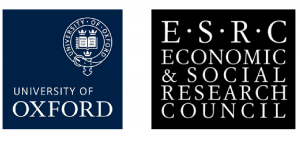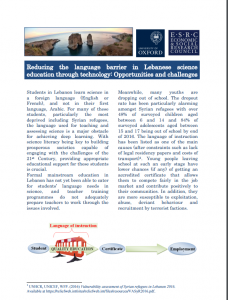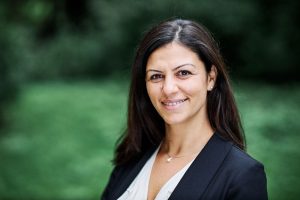The Project
Mathematics and science are taught and assessed in a foreign language (English or French) in Lebanon; not Arabic, the first language of most students. The use of a foreign language of instruction in mathematics and science is a contentious issue in Lebanon and constitutes a significant barrier for access to quality education, especially in deprived communities where students’ and teachers’ proficiency in the language of instruction is typically poorer.
While the issue is not new in Lebanon, it has certainly attracted greater attention in the past few years following the influx of over half a million student-aged Syrian refugees into Lebanese schools and a drastic dropout rate estimated to be as high as 400,000 students in 2014. The reasons behind such high dropout figures are multiple yet the foreign language of instruction was considered to be a main one after constraints such as legal status, socioeconomic pressures, costs of transport to schools, etc. Indeed, Syrian students learned mathematics and science in Arabic in Syria and have not been provided with adequate support to cope with the high demands of the foreign language of mathematics and science instruction. The public formal education sector was overwhelmed by the size of the crisis so civil society and non-governmental organisations (national and international) attempted to fill the gap by providing non-formal education programmes to save the ‘lost generation’ of young Syrians.
In this project, Dr Yasmine El Masri collaborates with a local NGO in Lebanon, Lebanese Alternative Learning (LAL). LAL provides an open access online platform (Tabshoura) that offers interactive educational tasks aligned with the Lebanese curriculum to widen access to quality education for underprivileged youths and Syrian refugees in Lebanon.
The project aims to address this issue with different stakeholders through:
- Knowledge exchange with LAL NGO which provides educational support to underprivileged youths,
- Capacity building and knowledge exchange with science teachers in schools serving deprived communities, and
- Working with underprivileged Lebanese and Syrian refugee students.
The project at a glance
For the educational material to best serve the needs of underprivileged youth, Dr El Masri worked closely with LAL NGO and piloted a number of science tasks developed on the Tabshoura platform with teachers and students from various schools and learning centres serving deprived communities. Findings of the pilot study have been used to modify existing tasks and inform the development of new ones.
Fieldwork
Piloting Tabshoura science items with students in schools and learning centres in Lebanon
Fieldwork was conducted during the month of May with Year 6 students in three educational institutions (schools and learning centres) serving deprived communities in Lebanon, two of which hosting Syrian refugees. Dr El Masri investigated the extent to which Tabshoura’s interactive science tasks could promote science learning and decrease the language barrier that many underprivileged students face.
Impact Events
Capacity building and knowledge exchange workshops with teachers (Edutek, April 2017 and Sonbola NGO, November 2017)
Dr Yasmine El Masri facilitated a series of capacity building workshops for teachers on designing tasks and writing questions. The first two workshops were organised in collaboration with LAL NGO on the 22nd and 29thApril at Edutek e-learning centre in the Bekaa Valley and targeted science teachers in schools hosting Syrian refugees (e.g. Don Bosco in Baalbek, Malala schools in Bekaa). The workshops aimed to raise teachers’ awareness of features that could increase cognitive and language demands of science tasks and develop teachers’ reflective practice and their ability to critique the quality of science tasks.
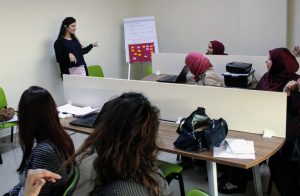
Dr El Masri delivering a capacity building workshop to teachers (April 2017, Edutek, Chtaura Lebanon)
After a first capacity building session in which science teachers were made aware of the various features that could increase cognitive and language demands of science tasks, teachers provided feedback on Tabshoura science tasks developed by the LAL NGO and suggested a list of guidelines for improving the tasks and developing new educational material.
An additional workshop was hosted on 16th November 2017 at Sonbola NGO in Anjar. Sonbola’s Tamkeen project offers educational support to Syrian refugee youth, many of whom are facing significant challenges in coping with the language demands of the Lebanese curriculum. The aim of the workshop was to build upon the capacity of teachers and volunteers at Sonbola Learning Centre to critically evaluate the quality of questions, of various subjects, in relation to the cognitive demands those questions could place on their students. Such skills will enable them to better support their students.
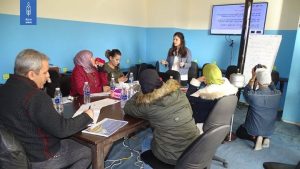
Dr El Masri delivering a capacity building workshop to teachers and volunteers at Sonbola NGO (November 2017, Sonbola NGO, Anjar Lebanon; Photo courtesy Sonbola NGO)
In addition to capacity building, the workshops provided excellent opportunities for knowledge exchange between teachers, the NGOs and the researcher. Workshops ended with participating teachers and volunteer educators receiving Participation Certificates in recognition for their invaluable contribution.
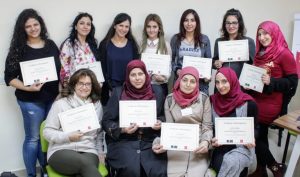
Stakeholders Dialogue, 26th November 2017, Beirut Lebanon
On Friday, 26th November 2017, Dr Yasmine El Masri hosted a Stakeholder Dialogue entitled “Reducing the language barrier in Lebanese science education through technology: Opportunities and challenges” in Beirut. The daylong event gathered researchers from various Lebanese universities, NGOs, science teachers from public and private schools and representatives of the Centre for Educational Research and Development (CERD) in Lebanon.
Dr Tamer Amin (American University of Beirut) gave a thought-provoking presentation at the beginning of the event that highlighted the importance of training teachers to cope with the challenges associated with the foreign language of science instruction in Lebanon. Dr El Masri gave a presentation that discussed opportunities and challenges associated with the use of technology to reduce the language barrier in science instruction and assessment.
Click on the image below to view the Stakeholder event flyer
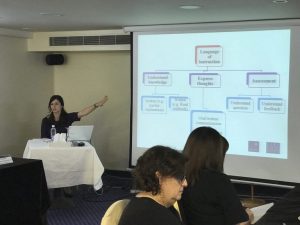
Dr El Masri delivering a presentation
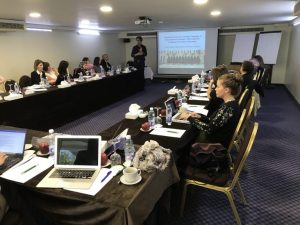
Participants listening to Dr Tamer Amin
Dissemination
ProLanguage conference: Beirut, 30th October 2017
Image courtesy LAL NGO
Dr Yasmine El Masri gave a joint presentation with Dr Nayla Fahed and Mr Nagi Ghorra from LAL NGO at the ProLanguage conference hosted in the Issam Fares Institute Auditorium at the American University of Beirut between 30th October and 1st November 2017. The presentation was entitled: “Addressing the language barrier in education using technology: The Tabshoura Project”.
To learn more about the ProLanguage Project click here.
LAL NGO provided an overview of their Tabshoura platform, including some of the offline solutions they developed in order to make their educational materials accessible to a larger number of students, especially those where there is limited internet access, such as in refugee camps. Dr El Masri highlighted the main language challenges that Syrian refugee students face when interacting with science tasks provided in English and French. Presenters discussed various approaches that could make Tabshoura more accessible to Syrian refugees (e.g. translating the tasks from English and French into Arabic, introducing specific instructions in Arabic, including a glossary of difficult terms in Arabic, etc.).
AEA-Europe annual conference: Prague, 10th November 2017
Dr Yasmine El Masri presented a paper at the annual conference of the Association for Educational Assessment – Europe (AEA-Europe) that was held in Prague between 9th and 11th November 2017. In her paper, El Masri uses data she gathered from the fieldwork in Lebanon to highlight the multiple challenges refugee students face when trying to cope with the host country’s assessment systems and cultures.
The abstract of the paper is provided below:
Abstract
Crossing assessment cultures and overcoming the language barrier: The case of Syrian refugees and vulnerable youths in Lebanon
Comparative international large scale assessments such as PISA, TIMSS and PIRLS have greatly shaped educational policy in various countries (e.g. Germany) raising concerns over the globalisation of assessment cultures and the normalising of assessment practices around the world. While some countries could argue that recent educational reforms have affected their assessment cultures and practices to mirror international assessment ‘norms’, there is little evidence to support that the way assessments have changed make it easier for youths to move across countries and share their experiences and understanding of the world. It is often the case that young people moving to new countries are compelled to adapt to the educational system and the assessment practices of that host country. This experience is particularly challenging for migrating students and is very distressful for young children that undergo forced displacement. Due to the scarcity of support, these children often fail to integrate into schools and ultimately drop out and become susceptible for exploitation and abuse. This has serious implications in terms of social justice and inequality.
In Lebanon, over half a million student-aged Syrian refugees have been experiencing immense challenges in trying to access quality education since the outbreak of the civil war in 2012, with dropout rates as high as 400,000 recorded in 2014. One of the most significant challenges has been that the language of instruction and assessment of both mathematics and science used in Lebanon, is English or French and not Arabic (i.e. the native language of both Syrian and Lebanese people). The language of instruction is a contentious subject in Lebanon and does not only constitute a barrier to quality education for Syrian refugees, it also delineates deprived Lebanese communities who typically host them. Both communities struggle to pass high stakes examinations in Lebanon at ages 15 and 18, for various reasons, with one being the language of mathematics and science assessment.
Various initiatives have been taken to widen access to quality education for underprivileged Lebanese youth and young Syrian refugees. One of these is that of a local NGO which developed an open access platform (Tabshoura) offering a number of interactive educational tasks in various subjects (mathematics, science, civics, etc.) in English, French and Arabic to support the learning of vulnerable young people in Lebanon.
This study analyses a subset of science tasks available on the Tabshoura platform, in terms of level of difficulty and demands, and attempts to better understand what makes science tasks more difficult for deprived youth in Lebanon and whether the interactive nature of the tasks reduces the language barrier.
An English and French version of an online test consisting of four interactive tasks was administered to a 100 vulnerable students (Lebanese and Syrian) in two host schools (English and French medium) in Lebanon. Scores on the tests were used to select 10 students to participate in cognitive interviews where they voiced their thoughts as they completed the tasks. Results of tests and cognitive interviews were used to manipulate tasks to make them less demanding and to write a list of recommendations for the development of new material that supports the learning of vulnerable communities in Lebanon and allows them to show what they know.
The paper provides an opportunity to discuss some of the significant challenges that young people going through forced migration face in relation to the distinct educational and assessment cultures between the host country and the country of origin and proposes interactive tasks as a way to bridge this gap.
OUCEA Symposium, 8th December, Oxford UK
On Friday, 8th December 2017, Dr Yasmine El Masri hosted a symposium on Technology and the Language Barrier in Education: From Lebanon to the UK at St Cross College, Oxford.
Speakers included Ms Muriel Albina (Lebanese Alternative Learning NGO, Lebanon), Ms Massa Mufti (Sonbola NGO, Lebanon), Prof Pauline Rea-Dickins (OUCEA), Dr Niall Winters (Department of Education, University of Oxford), Dr Maha Shuayb (Centre for Lebanese Studies) and Prof Agnes Kukulska-Hulme (Open University). The event concluded with a panel discussion that focused on the implications for teaching and assessment of migrants in the UK. Panel members included Dr Jess Briggs (Department of Education, University of Oxford), Mr Ezekiel Sweiry (Assessment and Qualifications Alliance, AQA), Mr Mike Solly (British Council), Dr Oksana Afitska (Lancaster University) and Ms Jenny Smith (Sheffield City Council).
Research Team
